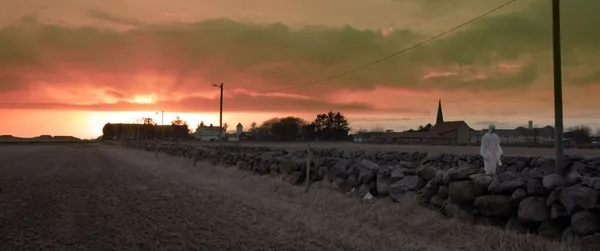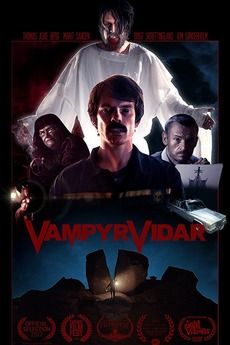Eye For Film >> Movies >> Vidar The Vampire (2017) Film Review
Vidar The Vampire
Reviewed by: Jennie Kermode

In Anne Rice's cult novel Interview With A Vampire (later adapted for the screen as Interview With The Vampire), the story is framed by the troubled bloodsucker's confession to an aspiring young journalist. In Vidar The Vampire, the confession is made to a psychiatrist - and regardless of how much or how little of Vidar's account we choose to believe, it's clear that this is something he really needs.
Let's be clear about this from the start: Vidar The Vampire is an offensive film. If you are sensitive about Christian beliefs, you may not even wish to read the rest of this review. You should also be aware that it's a film that invites us to feel sympathy for a hero who commits sexual assault. It finds its humour in very dark places. But the interesting thing about this film is that even at its most childish, it's not setting out to offend just for the sake of it. There is a point to all this. In fact, it's a film full of sharp observations that highlights just how obnoxious certain commonplace behaviours are even as it invites us along for the ride. Packed full of sly Biblical and literary references, it's a film that knows its stuff - and it's also an intermittently grotesque horror comedy with something to satisfy even the most lowbrow of genre fans.

Growing up on a little farm outside Stavanger, getting up at dawn every day to feed the animals and care for his ailing mother, Vidar (Thomas Aske Berg) can't even go to church without people taking the piss out of him. He maintains his faith - all he really has to keep him going - but echoes Janis Joplin in his wish that Jesus' love would manifest in more material ways. One night, at the end of his tether, he prays for God to grant him freedom, a more exciting life, and the opportunity to sample a variety of women in their twenties and upwards. Subsequently, in what might be a dream or a vision, a horned, naked woman appears to him - perhaps the result of indulging in too much cheesy porn close to bedtime - and leads him along a lengthy vagina-like passageway into a cave where, to his surprise and awe, his lord and saviour appears to him. If he will only get down on his knees and demonstrate his willingness to consume the body of Christ, he is told, his prayer will be answered.
"What if Jesus and Lucifer are the same person?" Vidar will ask later, in one of the film's less subtle moments. The blurring of lines between different types of religious devotion closely evokes James's Hogg's Private Memoirs And Confessions Of A Justified Sinner, and doesn't need to press its point to pass comment on the materialism of some of today's evangelicals, but whilst this Jesus (played by Brigt Skrettingland) differs from the pure and noble figure of Anglican tradition, he owes something to the warrior king archetype first used to convert Norwegians to the faith. Vidar certainly has a friend in Jesus, who resurrects him more than once as he struggles to get the hang of his new allergy to sunlight and dependency on drinking human blood. The trouble is that Jesus is a show-off, always first in there with the ladies, turning water into wine and making everything feel like a party. Vidar, with his scruffy overalls and bad hair and complete lack of social graces, can't keep up. Jesus gives him money, introduces him to prostitutes and even accompanies him to an addiction support group, but it's a troubled, increasingly codependent relationship. How long can it last?
The heart of the film lies in the interplay between these two characters, which is developed with skill and sensitivity despite the crudity of many of their words and actions. Skrettingland gives us what is easily the most entertaining screen Christ to date, but of course it's Berg who has the more demanding role, with Vidar wallowing in self-pity, threatening to drown in his own sense of entitlement. Beautiful comic timing (supported by Tommy Enervold Jørpeland's crisp editing) keeps the viewer enthralled by his hapless antics as he drifts further and further from what he once understood as virtue.
Although there are a lot of strong ideas here, the film occasionally over-reaches itself and the second half isn't quite as tight as the first. Still, it's a film with enormous personality which puts to shame all those lazy comedians who think shouting insults and giggling is enough to create edgy humour. Although its arguments are not new, they're delivered with gusto. Its iconographic imagery is both sumptuous and awful, its visual wit as sharp as its verbal wit, and undercutting it all is a desperate sense of pathos. Existential playground humour rarely gets this good.
Reviewed on: 09 Jun 2018
















